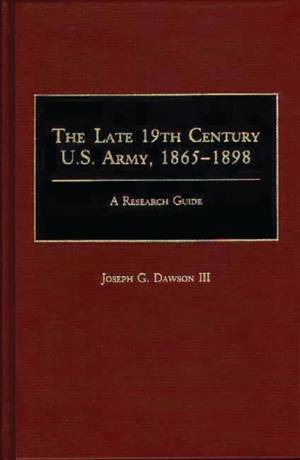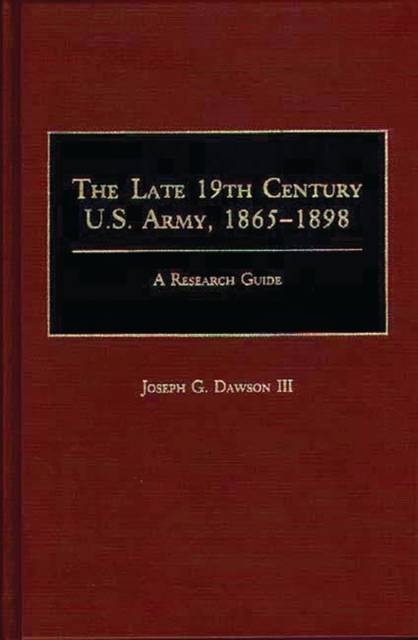
- Retrait gratuit dans votre magasin Club
- 7.000.000 titres dans notre catalogue
- Payer en toute sécurité
- Toujours un magasin près de chez vous
- Retrait gratuit dans votre magasin Club
- 7.000.0000 titres dans notre catalogue
- Payer en toute sécurité
- Toujours un magasin près de chez vous
Description
A strong addition to the existing military history reference literature and to its series. . . . Dawson's research guide is more useful than a standard bibliography, and much more thorough for the time period covered than [other] sources. . . . Dawson builds his guide around more than 1,100 bibliographic entries, many of which have brief, descriptive annotations. The citations, arranged topically in eight chapters, are drawn from books, periodicals, and dissertations. A ninth chapter covers pertinent government documents and manuscript collections. Author and subject indexes and four useful appendixes are included. There is a fine introductory essay: the preface lists and briefly describes 50 top secondary sources selected from the larger body of literature. These features truly enhance the bibliographic core of the book and make it a guide useful to general readers, upper-level undergraduates, graduate students, and scholars. Choice
The period between the Civil War and the end of the nineteenth century was a time of hard choices for the U.S. Army and those who led it. The federal government thrust numerous responsibilities upon the military, including pacifying the Indians, patrolling the defeated Confederacy, suppressing striking laborers, and supervising national parks. This comprehensive bibliography focuses on this period of military history, cataloging, surveying, and appraising the substantial body of contemporary and historical literature that traces the evolution of the U.S. Army from 1865 to 1898. As the largest single-volume reference work of its type, the book covers all major aspects of Army activities, and contains annotations on 80 percent of its entries. Following a series foreword by Roger J. Spiller and a brief introduction, the volume begins with an extensive survey of government documents and manuscript collections. Included here is a wide variety of U.S. government publications pertaining to the Army, many from the late nineteenth and early twentieth centuries. Subsequent chapters group sources under bibliographic topics, such as general secondary works, fiction, and memoirs and contemporary accounts, as well as under subjects that refer to the Army's activities. These include the Army and Reconstruction, the Indian-fighting Army, forts and post life, the late 19th century Army, and coastal defense. A series of appendixes provides a period chronology, list commanding generals and secretaries of war, and chart army strength. A set of author and subject indexes conclude the work. The Late 19th Century U.S. Army will be an important addition to the collections of public and academic libraries, and a useful resource tool for courses in U.S. history and military history.Spécifications
Parties prenantes
- Auteur(s) :
- Editeur:
Contenu
- Nombre de pages :
- 272
- Langue:
- Anglais
- Collection :
- Tome:
- n° 3
Caractéristiques
- EAN:
- 9780313261466
- Date de parution :
- 24-10-90
- Format:
- Livre relié
- Format numérique:
- Genaaid
- Dimensions :
- 161 mm x 240 mm
- Poids :
- 603 g

Les avis
Nous publions uniquement les avis qui respectent les conditions requises. Consultez nos conditions pour les avis.






